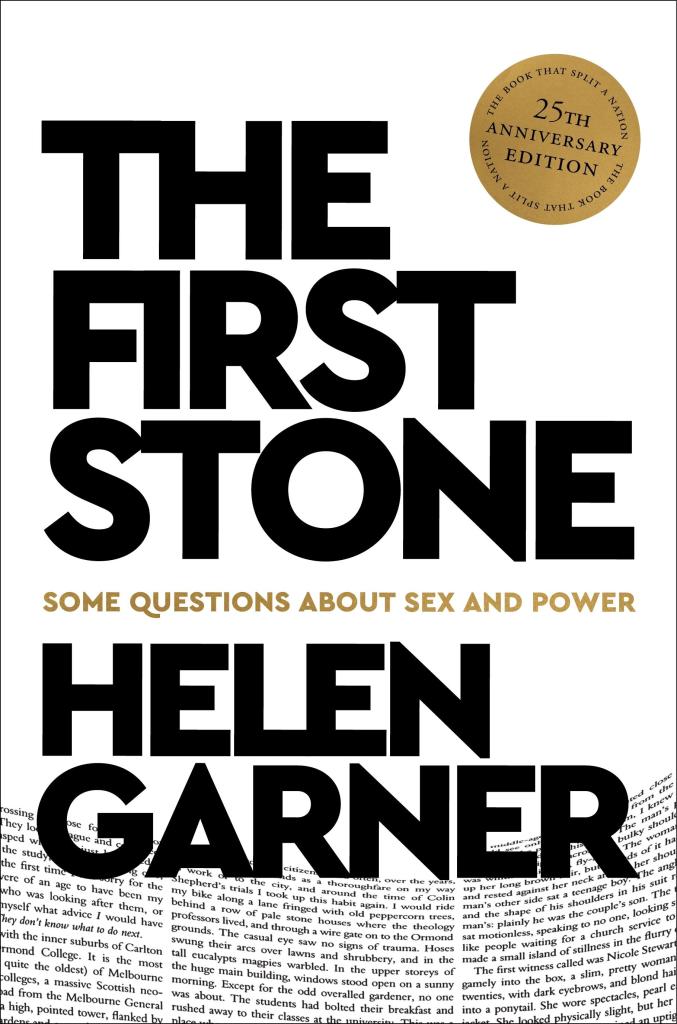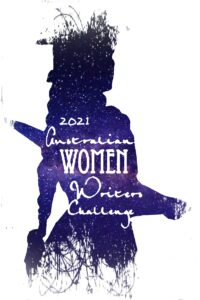It was the little sticker announcing ’25th Anniversary Edition’ that attracted my attention to The First Stone, which I read back in 1998. Is it really 25 years since this came out? How did this edition differ to the original? I wondered. Has Helen Garner added anything to this book? How does she feel about The First Stone now? How do I feel about The First Stone now?
Well, the first and easier questions first. This edition has a foreword written by Leigh Sales in November 2019, and has three additional pieces at the end. The first of the additions, ‘The Fate of The First Stone’ is a speech delivered by Helen Garner herself as the Sydney Institute’s Larry Adler lecture in August 1995, just after the book had been released and when Garner herself was coming under heavy criticism. The second ‘Helen Garner’ was written by David Leser and published in the Good Weekend in March 1995. The final piece is an excerpt from Bernadette Brennan’s A Writing Life: Helen Garner and her Work first published in 2017. Garner herself has not added anything else to the book. I was interested that its publication in 2020 did not seem to provoke any further commentary from her or anyone else for that matter. And so, I don’t know how she feels about The First Stone now. The only question that I can answer is how I feel about The First Stone now.
So what was The First Stone? It was a book where Garner reflected on the case of the Master of Ormond College at Melbourne University, who was charged with indecent assault by two female students. The events had occurred after the ‘smoko’ after the Valedictory Dinner in October 1991. One student claimed that the Master had groped her breast while they were dancing; the other claimed that he had asked her into his office after the smoko and groped her there. He denied both accusations. The charge on the second offence was dismissed in the Magistrates’ Court. He was found guilty on the first groping charge, but successfully appealed the verdict in the County Court. After initially backing the Master, Ormond College withdrew their support and he lost his position.
On first reading about the groping case, Garner, as a veteran of the women’s movement of the 1970s, was appalled that the girls had gone to the police over what she saw as such a minor offence. After all, she and practically every woman she knew had been exposed to similar lewdness. She felt that the feminist struggle had been transmogrified into a legalistic, puritanical, punitive, petty process, that conflated minor infractions and egregious assaults. Her immediate response was to write and send a letter of support to the Master of Ormond College, who was personally unknown to her. When she came to interview the women themselves and their supporters, she was seen as being an apologist for the Master and to have betrayed her own feminist identity. Positions quickly hardened, on both sides, despite Garner depicting her book as series of questions and reflections.
I read The First Stone in January 1998 and then quickly followed it up with Virginia Trioli’s Generation F (which has also been republished in late 2019) and Jenna Mead’s Bodyjamming, the latter two written fairly soon after the original book’s publication. I noted in my reading journal that Trioli’s book was seductively easy to read, but that I felt that I had had enough after Jenna Mead’s edited collection of essays. It is hard to capture now just how controversial Garner’s book was. It was pretty unedifying really. Reading it 25 years later, I found myself wincing at her venom against the feminist supporters of the two women, and her blithe dismissal of the power imbalance between the Master of Ormond College and two students. Garner bridles against the smooth entitlement of the ‘Ormond Man’, but seems oblivious to how it would reinforce power, when two young women took on The Establishment writ large, as Ormond College surely is, by taking their complaints to police. Reading the essays that follow the reprint in this Anniversary edition, I am not comforted by the fact that she spoke at the conservative Sydney Institute, or that her stance was supported by conservative commentators P.P. McGuiness or John Laws (much to Garner’s own horror). She tried to interview the two women, but they would not speak to her (as indeed was their right), and they have kept their silence ever since. No doubt, The First Stone would have been a different book had they spoken to her, but I’m not sure whether it would have entrenched, or challenged, Garner’s argument.
Nonetheless- and that’s a very Garneresque thing to say- her point about ‘degree’ still stands. Reading this edition, 23 years after I first read it, I am now closer in age to Garner (both then and now) than I am to the young women. I do wonder about, and am glad that I do not have to negotiate, the sensitivities over ‘ongoing consent’, and the red-lines over banter and flirting. I enjoy Garner’s writing- I always have- and even though I intended reading only the foreword and the closing essays, it was so easy to be drawn into re-reading her original book, with her mixture of self-effacement yet grit, her questioning and her uncertainty. The older I become, the more appreciative I am of nuance and ambivalence, and you find them both in her writing.
But – and there’s another very Garneresque expression- 25 years later we have had the ‘Me Too’ movement, something that Garner herself pre-figures in the book by telling us of her own experiences, some where she felt she had agency, others where she did not. The organizational and legislative channels that were in their infancy then -and indeed had been created as a result of the work of those 70’s feminists – failed the young women at the time but have become more robust. Even more disturbingly, we have seen a number of powerful, well-connected, QC-laden men rebut ‘strenuously’ (as if the strength of their rebuttal is sufficient proof of their innocence), and often successfully, the accusations against them through the courts, sometimes in their own defence, at other times in order to seek legal redress from their accusers. Today, the power-relations implicit in this case would be not have been overlooked, or side-lined, as they were at the time.
However- and there’s another qualifier – even though it might seem more clear-cut, questions still remain. Because we are talking about ‘humans’ and ‘relations’ then questions should, must remain. There might not be many who would spring to the Master of Ormond College’s defence today – would Garner? (I don’t know). In that regard, the book has dated badly. But the questions of proportionality, agency/victimhood, generational change, the law, class and feminism are just as pertinent – if not more pertinent- today.
My rating: How do I rate this? Should I rate high because it drew me in just as much as it did when I first read it. Or should my rating reflect the fact that time has moved on? I don’t know. I can’t say
Sourced from: Yarra Plenty Regional Library
I have included this on the Australian Women Writers Challenge Database.



Yes, interesting that nobody took much notice of the re-release.
My view of unwelcome groping is that the time to make a fuss is at the time. Complaining about it long afterwards isn’t fair to anybody, not least other women who need to be warned about the groper.
I wonder if it was released without any input from Garner. I thought that there would have been interviews with her, asking her how she feels about it now, but I couldn’t find any.
Perhaps it was just a cynical re-issue to take account of #MeToo.
At the time, I was much more upset by Helen Garner than I was by the Master of Ormond College at Melbourne University. After all, he had all that personal pleasure, groping young pretty and intelligent undergrads whereas I never understood what motivated Helen Garner’s apparent dismissal of the students’ pain.
She felt that “the feminist struggle had been transmogrified into a legalistic, puritanical, punitive, petty process, that conflated minor infractions and egregious assaults”. Too bad, Ms Garner.
Pingback: Six Degrees of Separation: from ‘Second Place’ to… | The Resident Judge of Port Phillip
Pingback: Non-Fiction (General) Round Up: August 2021 | Australian Women Writers Challenge Blog
Pingback: Classics and Literary Round-up: August 2021 | Australian Women Writers Challenge Blog
Thank you so much for this write up. I’ve had a copy of The First Stone on my shelf for a while now, but I’ve been hesitant to pick it up because I love Garner so much – I’m worried that reading it might colour how I feel about her. It might be better if I pick up this more recent edition with the addendum.
Yes. Particularly the segment by Bernadette Brennan helps to contextualize the original book. I love Garner too, and although I felt uncomfortable at times, I had to remind myself that the book was 25 years old.
Pingback: Australian Women Writers Challenge 2021 | The Resident Judge of Port Phillip